Last week, as part of our annual AKO Caine Prize coverage, we ran Guest reviews of the 5 stories shortlisted for the 2022 award. This week, and leading up to the winner announcement on Monday 18 July, we are very pleased to be sharing a new set of AKO Caine Q&As – accompanying each of the authors on the shortlist will be responses from publishers, as well as from the judges who have shortlisted from all the stories entered into the Prize this year, so opening up our conversations around the Prize to other roles and participants.
![]()
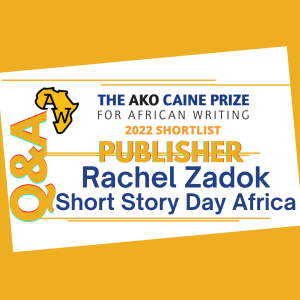
Today, we’re delighted to share a Q&A with Rachel Zadok from Short Story Day Africa, publisher of Idza Luhumyo’s AKO Caine Prize shortlisted story, “Five Years Next Sunday”, in the SSDA anthology Disruption: New Short Fiction from Africa (SSDA / Catalyst Press, 2021).
This conversation with Rachel about the variety of literary labour and work that Short Story Day Africa does is part of a welcome first for us at AiW in our coverage of the AKO Caine Prize, exploring the experience of the publishers of the stories on the shortlist.
SSDA is an organisation, project, and team, founded to provide a supportive, enabling platform for African writers, “About us. In our own voices”:
“[…] In the eight years since it was formed around a kitchen table, the SSDA team has developed a survival ethos: to subvert and reclaim. Reclaim the place of the short story. Reclaim a space for non-conformist writing. Subvert ideas about what it means to be a writer in Africa. Subvert ideas about what makes a story African.”
(About SSDA)
![]()
AiW: Many thanks, Rachel, for agreeing to speak with us as the publisher of Idza Luhumyo’s AKO Caine Prize 2022 shortlisted story, and opening up these often less visible roles in a literary prize.
As its publisher, could you tell us about your journey of/with “Five Years Next Sunday”, your story of the story, so to speak. How did it come to you? What made you “see” it, and as a Caine Prize story?
Rachel Zadok: Idza entered “Five Years Next Sunday” for the Short Story Day Africa Prize in 2019. That year, the theme for stories was Disruption. We select 21 of the stories entered to go through our editing process, which is quite rigorous as it’s designed to help writers develop their craft alongside the editor, rather than have an editor “fix” a story for publication. The resulting publication from that year is Disruption: New Short Fiction from Africa.
 It’s tricky to say what made us “see” it. You can develop a kind of fatigue when reading two to three hundred stories in a slush pile. You start questioning whether you’re missing something, whether you’ve lost your ability to tell if a story is good or not.
It’s tricky to say what made us “see” it. You can develop a kind of fatigue when reading two to three hundred stories in a slush pile. You start questioning whether you’re missing something, whether you’ve lost your ability to tell if a story is good or not.
Then, bang, you read a story like “Five Years Next Sunday” and you just know. There’s a certain indefinable spark that gets your jaded synapses firing in excitement. This story has that spark. It’s funny, because it’s easy to see when it’s in front of you, but impossible to say what makes it a standout from another well written story that doesn’t have the same magic.
I don’t actually look at stories and see them as Caine Prize stories or not. It’s more that I see them as SSDA stories. Stories that subvert, reimagine, reclaim writing from the continent. From there, we just pick the ones we think are winners by our standards to enter into other prizes or opportunities for the writers. You can’t possibly know what other judges or publishers are looking for — we only know what we’re looking for.
I tell all the writers we publish that it’s all pretty subjective, and not to get disheartened if they’re not on shortlists. One writer may never make a shortlist, yet go on to pick up an agent or pique the interest of a publisher through their involvement with SSDA. It’s all about visibility and pushing the emerging writers we work with to give their stories their all.
Why this story, why now?
I think the story touches on identity, but it does so through the narrative without ever resorting to lecturing the reader. So often now in narratives around identity it feels the writer has cobbled together a series of rants from social media, and the character is just a talking head there to soliloquize those ideas.
Idza is a very adept writer. She has a beautiful natural way with words, a raw talent, one she’s worked hard to perfect. There are no talking heads in Idza’s stories. Her characters have rich lives and she gets all her themes across without ever spelling them out. It’s a tapestry of love, life and themes. I think that’s what good storytelling does. You walk away with a better understanding of another human’s perspective without it having to be spelled out for you.
Please tell us a bit more about your work more broadly with African writing and how things are on the ground for you now (perhaps particularly given our experiences over the last couple of years).
 SSDA is a project that works to develop writers and editors on the continent and also to give them a platform for their work. Right now we’re running a project called Inkubator which is a series of workshops and a closed supportive environment where they can work on their stories together with facilitators and the SSDA team. We’ll be collecting their stories into an anthology at the end of the year, when Inkubator comes to a close. It’s funded with a grant from the British Council.
SSDA is a project that works to develop writers and editors on the continent and also to give them a platform for their work. Right now we’re running a project called Inkubator which is a series of workshops and a closed supportive environment where they can work on their stories together with facilitators and the SSDA team. We’ll be collecting their stories into an anthology at the end of the year, when Inkubator comes to a close. It’s funded with a grant from the British Council.
I’m not sure what we’ll do next. We haven’t managed to secure any funding for the SSDA Prize since Disruption. Funding for the arts was hard to find before, and it feels like an almost impossible task since the pandemic. The pandemic really hit SSDA hard. It’s always been underfunded, but we supported it by giving our time and skills to it because our personal finances were stable and we could do that. That’s no longer possible. I don’t think many people realise how much we managed to do on a shoestring budget and a lot of passion.
What is the most valued advice you’ve received about navigating your industry? What jobs or roles would you like to see become more visible?
Not sure I’ve ever been given any life-altering advice about this industry. I wish someone had told me to register SSDA as an educational entity and not an arts entity back in 2011 when I started SSDA. But, really, back then I was just seeing gaps in the African literary landscape and trying to find ways to fill them by creating programmes and opportunities. We’re still doing that.
Two gaps I do see are that we need more local African editors for African stories, and that we need to find better distribution channels for publishers on the continent for our stories. The first one we’re slowly chipping away at by running our Editing Mentorship Programme, or we were when we had funding. I have an idea for the second, but it would need a big chunk of investment to get off the ground. I live in hope.
What are the most ethical and/or heart-lifting practices you’ve seen happening recently in your industry?
I don’t think it’s a recent thing, but the most heart-lifting practice is the generosity of the African writing community. There’s a real willingness from writers who have had success to share their skills and mentor others in the space. Every writer we approached to facilitate workshops responded enthusiastically. And they’ve all gone beyond our expectations in their willingness to join the forum and give of their time and knowledge to the writers in the Inkubator.
How can our books and online communities best offer support for your work with African writing?
I think linking back to the original publications or organisations that developed the stories/writers would be helpful, so those who read your books come to have a better understanding of where the writers are being developed.
I think visibility is important, and in the past it has felt that the original publishers / organisations have been almost invisible. I’m so glad to see that this is now changing, and that you’re doing a lot of work to include the publishers/organisations.
![]()
Rachel Zadok was born in Tel Aviv and raised in Johannesburg. She has a National Diploma in Fine Arts. In 2001, she escaped a career in advertising to become a writer, which she describes as being a little like running away to join the circus without the safety net. She is the author of two novels: Gem Squash Tokoloshe (2005), shortlisted for The Whitbread First Novel Award and The John Llewellyn Rhys Prize, and longlisted for the IMPAC Award; and Sister-Sister (2013), shortlisted for the University of Johannesburg Prize and The Herman Charles Bosman Prize, and longlisted for the Sunday Times Fiction Award. She lives in Cape Town with her husband and daughter.
http://shortstorydayafrica.org/about
![]()
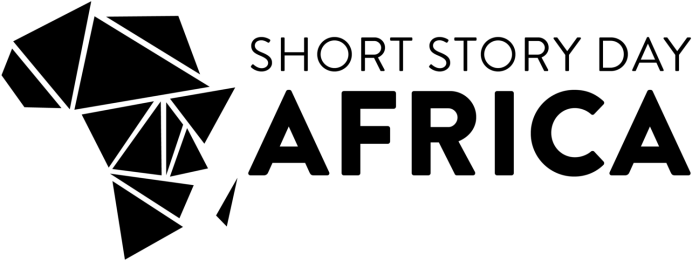
Go to Short Story Day Africa to find out more about the work that they do with and for writing from the continent, or check out the links throughout Rachel’s Q&A above for the specific strands and projects she mentions there.
fb.com/ShortStoryDayAfrica | @ShortStoryAFR | @shortstorydayafrica
![]()
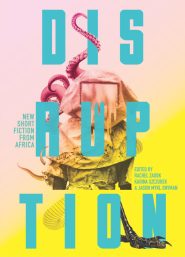
About Disruption: New Fiction From Africa:
This genre-spanning anthology explores the many ways that we grow, adapt, and survive in the face of our ever-changing global realities. In these evocative, often prescient, stories, new and emerging writers from across Africa investigate many of the pressing issues of our time: climate change, pandemics, social upheaval, surveillance, and more.
Edited by Jason Mykl Snyman, Karina M. Szczurek, and Rachel Zadok
Head to Catalyst Press to purchase the book, and for links to read excerpts.
![]()

Our accompanying AKO Caine Q&A today is with Idza, who talks about the pre-lives of her SSDA Prize-winning and AKO Caine Prize shortlisted story “Five Years Next Sunday”, writing, bookshelves, and what she’s up to now…
Yesterday, we spoke with Johanna Ingalls, managing editor and director of foreign rights at Akashic Books, publisher of Accra Noir — a collection which includes Billie McTernan’s “The Labadi Sunshine Bar” and “When a Man Loves a Woman” by Nana-Ama Danquah — and Addis Ababa Noir, where Hannah Giorgis’ “A Double-Edged Inheritance” appears, anthologies co-published with Cassava Republic Press in the UK.
![]()
Last week, Malawian writer, blogger and environmentalist Yamikani Mlangiza reviewed Luhumyo’s “Five Years Next Sunday” for us, bringing out its “art” and “poetic intensity”. Her piece, “The illusion of choice”, with links to read Luhumyo’s story in full via the AKO Caine Prize website, can be found direct here.
For these, and the other posts in our AKO Caine Prize series, please follow this link – including our latest Q&As and our other 2022 shortlist reviews from our Guest Authors: Joseph Kwanya (Kenya); Megan Brune (South Africa); Nnaemeka Ezema (Nigeria); and Innocent Akilimale Ngulube (Malawi).

![]()
NB: Our Caine Prize archives stretch back to when we first joined the Caine Prize “blogathon” back in 2013… of interest among them re. today’s Q&A posts might be our reviews of the SSDA Caine Prize shortlisted stories over the years: from 2019 – Tochukwu Emmanuel Okafor’s “All Our Lives”, and “Sew My Mouth” by Cherrie Kandie – as well as a Caine Prize follow-up piece that year from AiW Editor, Kristen Stern; and each of our reviews of SSDA’s 2014 Caine Prize shortlisted stories – Okwiri Oduor’s “My Father’s Head”, the story that won the 2014 Caine Prize; “Phosphorescence” by Diane Awerbuck; and Efemia Chela’s “Chicken”.
![]()
The 2022 AKO Caine Prize winner will be announced on July 18th. Head to the AKO Caine Prize website – http://www.caineprize.com/ – for more, and for details of the line-up of related events and author/publisher appearances.
Categories: AiW Featured - archive highlights, Conversations with - interview, dialogue, Q&A
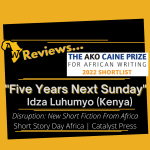

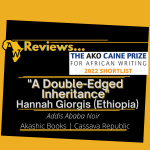
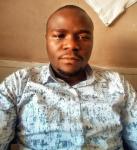





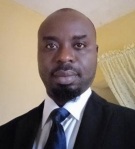
 Words on…Past & Present: The International Black Speculative Writing Festival (London & Remote)
Words on…Past & Present: The International Black Speculative Writing Festival (London & Remote)  Q&A: Publishing roundtable – #ReadingAfricaWeek
Q&A: Publishing roundtable – #ReadingAfricaWeek  Q&A: George Norman Sylvester – Ananse comics, Captain Pepsodent and African superheroes in 1990s Ghana
Q&A: George Norman Sylvester – Ananse comics, Captain Pepsodent and African superheroes in 1990s Ghana  Review Q&A: ‘Anxious Joburg: the inner lives of a Global South City’ with co-editor Nicky Falkof
Review Q&A: ‘Anxious Joburg: the inner lives of a Global South City’ with co-editor Nicky Falkof
join the discussion: